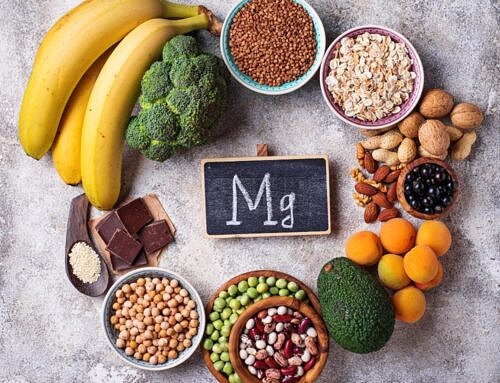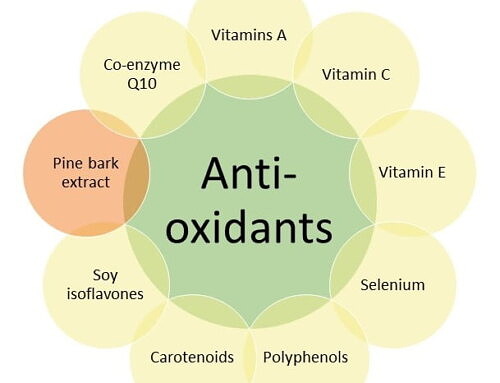
1 What is it?
Vitamin B12 is also known as cobalamin. It helps to keep our blood and nervous system healthy, and is important for our DNA production. The nutrient is believed to be important for our brain health.
There are various forms of the vitamin, but to keep this simple I am going to discuss it generically.
2 Vitamin B12 and its link to energy
The different forms of vitamin B12 have various important roles for energy. In our blood, it is important for red blood cell production. Without it we may not have enough red blood cells and they may be misshapen (megalobastic anaemia). Red blood cells are, of course, important for the transport of oxygen around the body and to our cells. We use this oxygen to utilise energy.
The vitamin also works within cells to help convert and utilise energy. Did you see the Friday Five about Coenzyme Q10 and Energy? B12 helps us to produce CoQ-10 ourselves.
One form of B12 has antioxidant properties helping us to reduce oxidative stress which is believed to inhibit energy conversion. Low B12 may also affect our levels of other antioxidants, thus reducing this effect further still.
3 Depletion/deficiency
Low levels of B12 can have big consequences for our health. Signs of low B12 include:
- Weakness and fatigue
- Breathlessness and dizziness
- Pins and needles (not just when you’ve been sitting awkwardly for a long time)
- Balance and coordination problems, including changes to how you walk
- An inflamed tongue
- Mouth ulcers
- Pale and jaundiced skin (the whites of your eyes may also look a bit yellow)
- Problems with eye-sight, including blurred vision
- Depression
- Dementia symptoms
- High temperature.
Remember that symptoms may have other causes – please discuss them with your doctor.
Severe deficiency may require B12 injections and not supplement tablets. Injections need to be prescribed by a doctor – as a Nutritional Therapist this is something I cannot help with.
Absorption of vitamin B12 is dependent on the digestive juices in our stomach which include a protein called the intrinsic factor. Unfortunately, some people have an autoimmune condition called pernicious anaemia. This condition attacks the cells that produce the intrinsic factor and reduces the individual’s ability to absorb the nutrient. Additionally, antacid medication or proton pump inhibitors (PPIs) may reduce our absorption. It is therefore important to address the causes of indigestion and not rely on antacids to relieve heartburn – no matter what the manufacturers’ adverts tell us! If you have concerns about your digestion or recurring heartburn, you should first seek advice from your doctor. If there are no medical issues, or one that is being managed, nutritional therapists (like me!) will be able to support you in dietary changes to manage your concerns. Do NOT change any medication without seeking advice from your doctor.
Due to the way we process vitamin B12, our ability to absorb it reduces with age, increasing the risk of deficiency in older people.
Not only can a B12 deficiency cause problems for our health, it can also affect our ability to use folate. This may be referred to as a ‘functional folate deficiency’. We don’t just need to consume enough of each nutrient, we need to be able to use them all effectively.
4 Sources
As B vitamins are water-soluble, we need to consume them in sufficient quantities daily. We don’t store the excess. However, we may retain some B12 due to our bodies’ recycling processes. Of course, this should not be depended on as the nutrient level will become depleted through use. So, where can we get vitamin B12 from?
Unfortunately for vegetarians and vegans (see below) the best sources are animal products. Good B12 sources include:
- Organ meats (liver and kidneys), particularly from lamb
- Clams
- Fish: Sardines, trout, salmon and tuna
- Beef
- Dairy products
- Eggs, especially the yolks
Plant-based sources include: nutritional yeast, fortified cereals, fortified brewers’ yeast, fortified milk alternatives, and nori (seaweed). However, the nutritional content of nutritional yeasts can vary by brand and whether or not they are fortified. Marigold Health Foods Ltd. state that their Engevita Nutritional Yeast contains 88% of the nutritional reference value (daily recommended intake target) per 5g serving (1 tablespoon). Furthermore, the amount of cobalamin in seaweed varies depending on where and when it is collected, and type. It is therefore not a reliable source of the vitamin.
5 Vegetarians and Vegans
As you can see from the information above, Vitamin B12 is generally only available in sufficient quantities in animal products. This is obviously a concern for anyone following a strict vegetarian, or vegan diet. It is therefore widely-recommended that individuals following such diets take vitamin B12 supplements to support their intake. This recommendation is made by vegan organisations as well as nutrition and health-based organisations. See Important below.
References/Further Reading
- “Vitamin B12 in Health and Disease” – O’Leary and Samman. https://www.ncbi.nlm.nih.gov/pmc/articles/PMC3257642/
- “B Vitamins and the Brain: Mechanisms, Dose and Efficiency – A Review” – Kennedy. https://www.ncbi.nlm.nih.gov/pmc/articles/PMC4772032/



